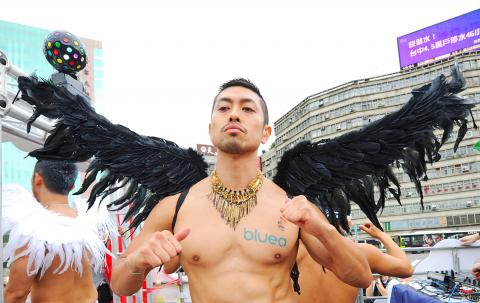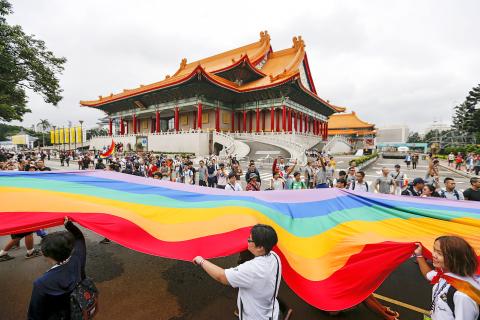Thousands of people yesterday took to Taipei’s streets to support the 14th annual Taiwan lesbian, gay, bisexual and transgender (LGBT) Pride Parade.
Braving rainy weather, the crowd congregated on Ketagalan Boulevard before standard bearers joined the crowd with a large rainbow banner to lead the parade.
Participants in ordinary clothing brushed shoulders with those dressed up in outlandish costumes and radiant colors. Some portrayed anime characters while others dressed up as princesses.

Photo: CNA
Promenaders ambled along Renai and Xinyi roads, covering the areas between Zhongshan S and Xinsheng S roads, before heading in opposite directions on Xinsheng S Road and returning to the stage.
The themes of this year’s parade were “Fun together” and “Honor diversity, like you mean it,” meaning that the goal is to break through “fake friendliness,” or gestures that are actually discriminatory toward people of differing sexual orientations, including lesbians, gays, bisexuals, transgender people, intersexuals, queers and asexuals.
Event organizers called on legislators across party lines to pass a proposed amendment to the Civil Code to legalize same-sex marriage and urged participants to assist by making telephone calls to legislators in their constituencies who have not signed petitions to endorse the proposed amendment.

Photo: CNA
An American who identified himself as Prent said he came from Taichung to support the event.
Prent said he heard about Taiwan’s reputation as a gay-friendly nation while working in China and decided to move to Taiwan.
“It would be amazing if the legislature passes the amendment to become the first Asian nation to legalize same-sex marriage, as it would likely inspire other Asian nations to follow suit and put Taiwan on par with Western democracies that have already done so,” he said.

Photo: EPA
Shu Kuge and Jared Braiterman, a gay couple living in Tokyo, said they came to Taipei just for the parade.
A number of Japanese attended yesterday’s parade, Kuge said, adding the Taiwan LGBT Pride Parade is the biggest event of its kind in Asia and is well-known in Japan.
Kuge said the Taiwanese government seems more supportive of same-sex marriage than the Japanese government, so it would be “exciting” if bills regarding same-sex marriage are passed, as it would likely set an example for Japan.

Photo: CNA
While foreigners praised the nation’s friendliness toward homosexual people, a number of Taiwanese who attended the parade declined to be interviewed or reveal their first names.
A Taiwanese surnamed Wu (吳) said he had not made public that he is gay, because he believed Asians, especially older people, tend to be more conservative and unwelcoming to homosexuality.
A promenader who identified himself as Da Mao (大毛) said he would like to be married to his partner someday, but that he is worried that his parents and older relatives might not approve.
He said that society has come a long way in terms of friendliness toward homosexual people and he has not had to deal with discriminatory labels that were attached to him when he was younger.
However, some people still do not accept gay people, particularly those involved in intimate relationships, which means there is still room for improvement before society can truly bring down the barriers between people of different sexual orientations, he said.

The CIA has a message for Chinese government officials worried about their place in Chinese President Xi Jinping’s (習近平) government: Come work with us. The agency released two Mandarin-language videos on social media on Thursday inviting disgruntled officials to contact the CIA. The recruitment videos posted on YouTube and X racked up more than 5 million views combined in their first day. The outreach comes as CIA Director John Ratcliffe has vowed to boost the agency’s use of intelligence from human sources and its focus on China, which has recently targeted US officials with its own espionage operations. The videos are “aimed at

STEADFAST FRIEND: The bills encourage increased Taiwan-US engagement and address China’s distortion of UN Resolution 2758 to isolate Taiwan internationally The Presidential Office yesterday thanked the US House of Representatives for unanimously passing two Taiwan-related bills highlighting its solid support for Taiwan’s democracy and global participation, and for deepening bilateral relations. One of the bills, the Taiwan Assurance Implementation Act, requires the US Department of State to periodically review its guidelines for engagement with Taiwan, and report to the US Congress on the guidelines and plans to lift self-imposed limitations on US-Taiwan engagement. The other bill is the Taiwan International Solidarity Act, which clarifies that UN Resolution 2758 does not address the issue of the representation of Taiwan or its people in

US Indo-Pacific Commander Admiral Samuel Paparo on Friday expressed concern over the rate at which China is diversifying its military exercises, the Financial Times (FT) reported on Saturday. “The rates of change on the depth and breadth of their exercises is the one non-linear effect that I’ve seen in the last year that wakes me up at night or keeps me up at night,” Paparo was quoted by FT as saying while attending the annual Sedona Forum at the McCain Institute in Arizona. Paparo also expressed concern over the speed with which China was expanding its military. While the US

SHIFT: Taiwan’s better-than-expected first-quarter GDP and signs of weakness in the US have driven global capital back to emerging markets, the central bank head said The central bank yesterday blamed market speculation for the steep rise in the local currency, and urged exporters and financial institutions to stay calm and stop panic sell-offs to avoid hurting their own profitability. The nation’s top monetary policymaker said that it would step in, if necessary, to maintain order and stability in the foreign exchange market. The remarks came as the NT dollar yesterday closed up NT$0.919 to NT$30.145 against the US dollar in Taipei trading, after rising as high as NT$29.59 in intraday trading. The local currency has surged 5.85 percent against the greenback over the past two sessions, central